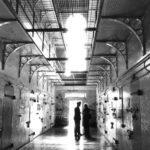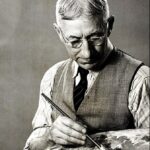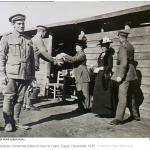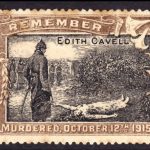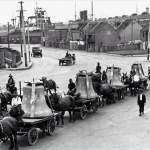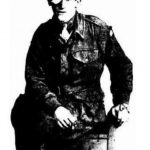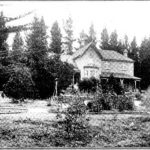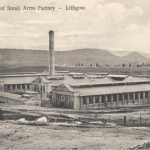Inside Parramatta Gaol, where Esther Bennett visited George Harris.
Read more →New Zealand born Cyril Ballard enlisted in the A.I.F in Sydney in 1916, aged 28. He was a records clerk, living quietly in the Northern Beaches suburb of Narrabeen with his wife Harriet and two children. Lance Corporal Ballard served in France as a machine gunner. His
Read more →Soldier Settlement was a federal, but state administered initiative which began during WWI. Land was purchased by government to provide small farms for returning servicemen, often on leasehold. One person who applied was my great-uncle Arthur Singleton, from Ulverstone. With the 12th Battalion he had taken part
Read more →Our first troops left Australia in late October 1914 following the outbreak of World War I. They disembarked in Egypt at Alexandria, and were then moved to a vast encampment near Cairo, where they continued to train in the shadow of the great pyramids. Soon, it was
Read more →IN APPRECIATION….. In 1931, Dr Victor Ratten performed life-saving surgery on 14 year old Myra Garnett at the Royal Hobart Hospital. Some weeks later the girl’s grateful father presented Dr Ratten with a generous and most appropriate gift. George Garnett was a British born art connoisseur and
Read more →In 1924, fundraising began for a carillon at Sydney University, to remember the undergraduates, graduates, and staff who died in World War One. When they hear the glorious peals of the carillon, young men will see visions and old men will dream dreams. Justice Street. The project was
Read more →Sydney born Harley Cohen was one of the first to enlist in WWI. His service number in the 4th Battalion was a very low 37. He was a slight figure, only 5′ 3″ tall and weighing in at a shade over 8 stone. He was university educated
Read more →For many years a retired grazier from Forbes, Mr James Smart Leslie, had a holiday home in the Blue Mountains at Blackheath. He named it Balquhain, after an ancestral property in Scotland. When WWI broke out, Mr Leslie and his wife Elizabeth (Betsy) were anxious to help.
Read more →HAPPY TO SERVE Cyril Blakney enlisted in the 12th Infantry Battalion as soon as war was declared in 1914. He was a compositor from Hobart, and also an accomplished musician and amateur actor. Such a fine looking young man. After the Gallipoli campaign Cyril served on the Western
Read more →On February 4 1908, Australian military officials approved a site at the coal mining town of Lithgow in New South Wales for a small arms factory. The fact that coal could be delivered to the site very cheaply was an important factor in the choice. With the
Read more →